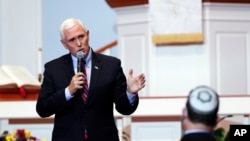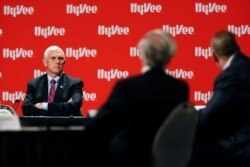U.S. Vice President Mike Pence traveled to Des Moines, Iowa, Friday to meet with faith leaders to discuss the “responsible” reopening of religious services to the public, in a roundtable discussion held at the Westkirk Presbyterian Church in Urbandale.
“It’s important as we reopen America that we help strengthen the foundation of this country,” Pence said, adding that he will “carry some of the best practices” for reopening back to the White House.
Pence traveled with two senators from Iowa, Chuck Grassley and Joni Ernst, both Republicans. A visibly emotional Ernst said that “we will pull through this [crisis] together.” Grassley said it is “God’s word” to be concerned about people who are less well off and that government has a role to play.
Iowa Governor Kim Reynolds, a Republican, announced last week that she would lift restrictions on religious gatherings and allow services to be held across the state with social distancing and increased sanitation.
At the roundtable, Reynolds said she is grateful that the administration is “recognizing the constitutional rights of religious institutions to govern their own worship.”
Some of the ideas discussed for safer and more responsible religious and spiritual gathering include setting up an online reservation system to limit the number of people in attendance and maintain social distancing, and making hand sanitizers and wipes available.
Michael Mudlaff, senior pastor at Westkirk, voiced reservations about masks. He requested that face coverings be deemed optional, adding that masks are “not conducive to relationships and let alone singing or responding in worship.”
Not everyone backs opening houses of worship immediately.
The Jewish community “uniformly” believes that it's too early to return to worship, said Rabbi David Kaufman of Temple B’nai Jeshurun, especially with “rising case counts in the communities.” He added that many members of the Jewish community in Iowa are over age 70.
“We urgently want to return. We just don't feel like now is the right time for us,” he said.
The participants of the roundtable included pastors and bishops of the Christian and Catholic faiths and Rabbi Kaufman but did not include leaders of other faiths.
Ending the roundtable with a group prayer, Pence commended the religious leaders for their strength. “I promise you, we are going to continue to stand by the religious liberty of every American until this is over, and then beyond,” Pence said to applause.
CDC guidelines
A day earlier, the Trump administration came under fire for blocking guidelines prepared by the U.S. Centers for Disease Control and Prevention, which include specific suggestions for reopening houses of worship, calling it “overly prescriptive and broad.” In a statement, a White House spokesman said, “Guidance in rural Tennessee shouldn’t be the same guidance for urban New York City.”
The CDC developed the guidance as dozens of states began reopening their economies. The White House has emphasized that the virus is affecting communities in different ways and has been pushing governors to come up with their own plans to restart businesses, schools, churches and other institutions.
Tim Carney, a research fellow with the American Enterprise Institute, supports the idea of allowing people to return to houses of worship. “Just as people need to get their jobs and get back to work, people need to get back to church. Community is absolutely essential to well-being in America,” he said, adding that the reopening of houses of worship must be done safely and within the guidance of the CDC.
The CDC’s guidelines should be issued by states to religious communities, Carney said. “CDC guidance will make everybody much more informed while they are making these decisions.”
A recent poll by ABC News/Ipsos shows 73% of Republicans are likely to start attending church, compared with 20% of Democrats.
Carney attributes the partisan divide on reopening houses of worship to political tribalism. “There's a lot of people who don't like the government telling them what to do, and if the government has closed down their churches, they want to get back into church as soon as possible,” he said. “And there's a lot of people for whom making a sacrifice during this time of this virus is almost like a religious sacrifice on their own part. They see that as them serving the higher good, which is the opposite of the way that the other half of the country sees it.”
Critics say the administration’s push to reopen the economy, including houses of worship, is politically motivated. The Reverend Quardricos Driskell, who teaches religion and politics at the George Washington University Graduate School of Political Management, said Trump is attempting to walk a fine line on religious freedom and win the support of his base by not restricting religious worship.
“I think that this is also a part of the president's efforts to mobilize minority communities,” Driskell said, adding that “by and large, minority communities tend to be more religious than the majority population.”
In Des Moines, Pence also visited the headquarters of Hy-Vee, a large chain of supermarkets, to hold a roundtable discussion about securing the nation's food supply. Iowa is home to multiple meatpacking plants that have been hit hard by the pandemic. Outbreaks in the state have prompted closures and risk disrupting the nation’s food supply chain.





